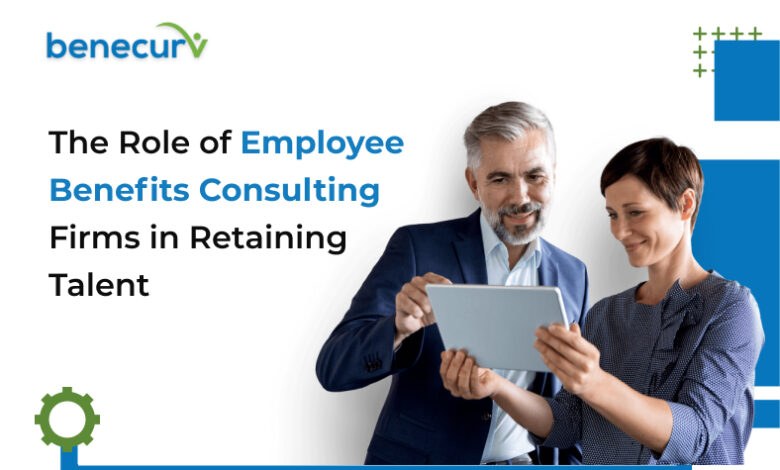The Role of Employee Benefits Consulting Firms in Retaining Talent

In today’s competitive job market, employee benefits consulting firms play a
critical role in helping companies attract and retain top talent. A comprehensive and
well-designed benefits package is no longer a perk; it’s an essential element in an
employer’s total rewards strategy. This guide explores the valuable contributions of
employee benefits consulting firms in enhancing employee satisfaction and reducing
turnover.
Understanding the Talent Retention Challenge
Employee turnover can be costly and disruptive for businesses. Replacing departing employees involves significant expenses associated with recruitment, training, and lost productivity. A recent study by the Work Institute estimates the cost of replacing a salaried employee can be up to 21% of their annual salary. Therefore, implementing strategies to retain valuable employees is a sound investment for
companies of all sizes.
How Employee Benefits Consulting Firms Help Retain Talent
Employee benefits consulting firms offer a range of services that can significantly
impact an organization’s ability to retain its workforce. Here are some key ways they
contribute to talent retention:
● Benefits Strategy and Design: Consulting firms help companies develop
benefits packages tailored to the specific needs and preferences of their
employees. This involves conducting benefit needs assessments,
benchmarking against industry standards, and designing cost-effective
solutions.
● Compliance and Regulatory Expertise: The benefits landscape is complex
and constantly evolving. Consulting firms ensure companies comply with all
relevant federal and state regulations related to employee benefits. This
minimizes legal risks and administrative burdens.
● Communication and Education: Effective communication is crucial for
employees to understand and appreciate the value of their benefits package.
Consulting firms help companies develop clear communication strategies to
educate employees about their benefits options.
● Benefits Administration Support: Managing benefits administration can be
time-consuming and resource-intensive. Consulting firms can provide
administration support services, including enrollment processing, claims
management, and vendor relations.
● Technology Solutions: Technology plays an increasingly important role in
employee benefits. Consulting firms can help companies implement benefit
administration platforms that streamline enrollment, communication, and
access to information for employees.
● Cost Management and Optimization: Controlling employee benefits costs is
a major concern for employers. Consulting firms can help companies identify
cost-saving opportunities without compromising the value proposition of their
benefits package.
Benefits Beyond Retention: The Value Proposition of Consulting Firms
While talent retention is a primary focus, employee benefits consulting firms offer
additional benefits for companies:
● Improved Employee Engagement: A well-designed benefits package can
boost employee morale, satisfaction, and engagement. This translates to a
more productive and positive work environment.
● Enhanced Employer Brand: A competitive benefits package can make a
company more attractive to potential candidates in a competitive job market.
● Reduced Administrative Burden: Consulting firms can free up valuable
internal resources by handling many administrative tasks associated with
employee benefits.
● Data-Driven Decision Making: Consulting firms utilize data analytics to help
companies make informed decisions about their benefits strategy and
resource allocation.
Choosing the Right Employee Benefits Consulting Firm
With numerous employee benefits consulting firms available, selecting the right
partner is essential. Here are some factors to consider during your selection process:
● Expertise and Experience: Look for a firm with a proven track record in your
industry and experience with companies of your size and needs.
● Service Offerings: Ensure the firm offers a comprehensive range of services
aligned with your specific requirements.
● Technology Capabilities: Consider the firm’s technology infrastructure and
its ability to provide modern benefit administration solutions.
● Communication Style: Choose a firm that prioritizes clear communication
and demonstrates a willingness to understand your unique business context.
● Cost and Fee Structure: Obtain clear information about the firm’s fees and
fee structure to ensure alignment with your budget.
FAQs: Frequently Asked Questions About Employee Benefits Consulting Firms
● Do small businesses need employee benefits consulting services?
Absolutely! Employee benefits consulting firms can be particularly valuable for small
businesses that may lack the in-house expertise and resources to manage their
benefits programs effectively.
● How much does it cost to hire an employee benefits consulting firm?
Costs can vary depending on the size and complexity of your organization, the scope
of services required, and the firm’s fee structure. Some firms charge hourly rates,
while others offer retainer agreements or project-based fees.
● Can employee benefits consulting firms help us reduce healthcare
costs?
Yes, many consulting firms specialize in helping companies control healthcare costs
through plan design strategies, vendor negotiation, and wellness program
implementation.
● What are some key trends in employee benefits?
The employee benefits landscape is constantly evolving. Some current trends
include a focus on personalized benefits options, increased adoption of technology
solutions, and a growing emphasis on employee wellbeing programs.
● How can I measure the success of our employee benefits program?
Several metrics can be used to measure the success of your employee benefits
program. These include employee satisfaction surveys, turnover rates, healthcare
cost trends, and utilization rates of benefit programs.
Conclusion: Investing in a Strategic Partnership
Partnering with an experienced employee benefits consulting firm can be a wise
investment for companies of all sizes. By leveraging their expertise and resources,
companies can design effective benefits programs that attract and retain top talent,
boost employee engagement, and control costs. In today’s competitive marketplace,
a well-designed benefits package is no longer a luxury; it’s a strategic advantage.



